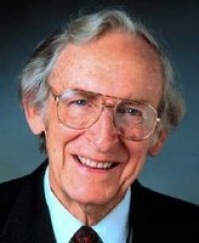Odum, Eugene Pleasants
| Topics: |
Eugene Pleasants Odum (1913-2002), an American ecologist recognized as the father of modern ecology for elevating the idea of the ecosystem as the field's dominant concept. Odum made the relationship between human activity and "natural processes" a cornerstone of his ecosystems concept. Prior to this, ecology was defined by small-scale studies of individual ponds, forests, lakes marshes, and other systems that were studied in isolation from each other and from society. His textbook, Fundamentals of Ecology (1953), became the standard reference for the study of ecology for decades. More than any other, this book changed the science of ecology from the study of the microcosm to the macrocosm—the study of how natural systems are interconnected. Odum also felt that humankind's interactions with the environment are influential, often problematic, and as part of the problem, humans must be part of the solution. With his brother Howard Odum, he was awarded the Crafoord Prize—the equivalent of the Nobel Prize in ecological sciences—from the Royal Swedish Academy of Sciences in 1987.
